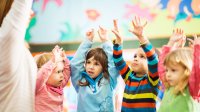Preschool Activities That Support Brain Development
Simple, everyday activities in preschool contribute to young kids’ brain growth at a critical period in their development.
Your content has been saved!
Go to My Saved Content.The human brain is constantly changing with every experience and interaction. Although experience-responsive brain growth occurs throughout our lives, and the brain’s most rapid growth occurs during gestation, there’s an intense second period of accelerated growth between ages 2 and 5. The brain responds particularly robustly to learning experiences, environmental influences, and emotional interactions during these childhood years. This is where preschool teachers come in.
These structural changes, reflected in children’s accelerating understanding skills, and in their cognitive, social, and emotional maturation, are the result of neuroplasticity, which is the activation of a group of neurons connected in a memory circuit that makes the connections stronger. That is the amazing process of learning. Neuroplasticity generates these changes in neural networks in response to knowledge and experience, enhanced by each new and repeated activation of the network.
Developing Executive Functions
The prefrontal cortex is where neural networks of executive function are especially rapid in neuroplastic-responsive construction from ages 2 to 5. These include attention focus, emotional self-awareness, and emotional self-regulation, as well as empathy, adaptability, and goal-directed behaviors. This means that the activation of a developing circuit such as emotional self-regulation (raising one’s hand before calling out) makes that skill stronger. Self-regulation will more likely be the response when the child practices it and receives positive feedback for waiting before reacting—for example, thinking before saying a first reactive response to a classmate who calls them a mean name.
These are the thoughtful decision-making skills that build as children are guided with experiences and feedback that promote social and emotional executive function network skills.
Social and Emotional Network Development
Since the strength of children’s executive function networks is a strong predictor of school readiness, including the development of literacy and numeracy, as well as social and emotional and academic competence, let’s look at interventions that can enhance the strengthening of these networks during early childhood.
- Teach children about their brains in preschool. Discuss what the students feel like when they’re stressed and how their brains react quickly (rather than thoughtfully) when they’re very stressed. Children can use guided practice to recognize their stress and calm themselves. This includes mindful breathing, counting to 10, calming visualizations, and activating optimistic memories.
- Cultivate empathy by imagining how a story character feels. Show the children pictures or a display of facial expressions, and ask them what emotions these images likely depict. Empathy development in social interaction skills begins to emerge around ages 2 to 3 as children become more aware of and responsive to the gestures, facial expressions, and actions of others and begin to connect these interpretations to what the other person is feeling. When children are prompted to describe how a person with a clear facial expression is feeling, they’re moving toward the goal of reflecting on other people’s perspectives as guides to their interactions. By identifying emotions depicted in emojis, picture books, and stories, children are also developing skills they need to be more aware of and verbal about their own emotions. When they can identify their feelings, they’ll be more facile at accessing the neural networks needed to calm themselves or reflect before acting.
- Use guided play with other children where they take on the characters of people in different jobs, or of different ages or backgrounds, to provide experiential opportunities for children to build expanded perspectives.
Attention Focus and Goal-Directed Behaviors
This skill set is what children need to persevere when facing the challenges and setbacks natural to the processes of developing literacy, building successful collaboration skills, and achieving emotional self-management. When children are prompted to predict what they’ll need to do next or in an upcoming situation—for example, what type of voice they’ll use when they get to the library or what supplies they’ll need to keep a new goldfish healthy—they activate goal-planning neural networks. There are many opportunities to help children build their delay of gratification or other impulse controls.
- The executive functions activated by deliberately focusing on achieving specific goals are built into games like Follow the Leader; Red Light, Green Light; and Simon Says.
Inhibitory controls that block distracting sensory information and delay immediate gratification urges so that goals can be achieved are found in the following activities: making ice pops; observing slow actions such as following airplane contrails or a trail of ants, or taking part in slow-paced activities like balloon tossing; finding differences in “identical” drawings; or trying to find Waldo in Where’s Waldo?
With any of these activities, it’s very important to help students recognize their progress.
It takes guided experiences and frequent opportunities over time for children to enhance their neural network control systems of emotional self-awareness and self-management. It’s helpful if the teacher is tuned in to the children’s changes in mood, behavior, friendships, and joy, and takes time to privately and even playfully depict dolls and action figures in similar situations and considers ways to change the reaction and situation.
Teacher efforts will be translated in the children’s brains into strong, durable, efficiently retrievable neural networks, and students will be able to use these valuable skills for the challenges and opportunities that lie ahead.
